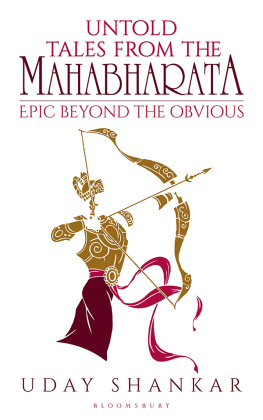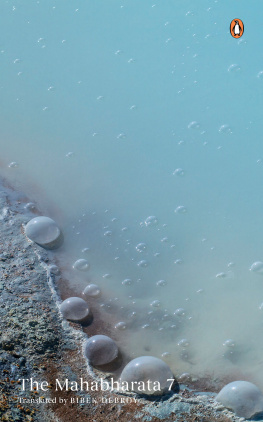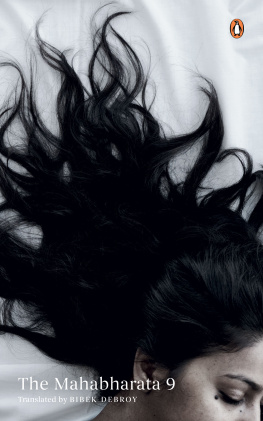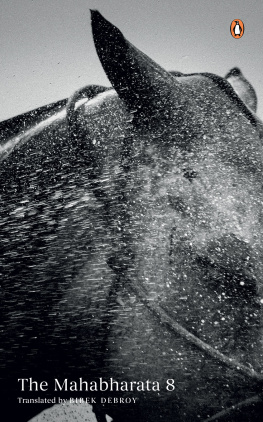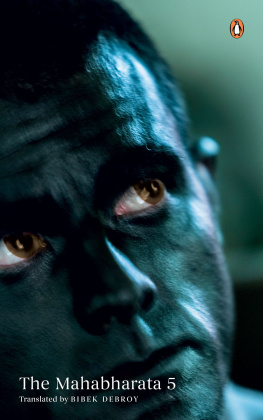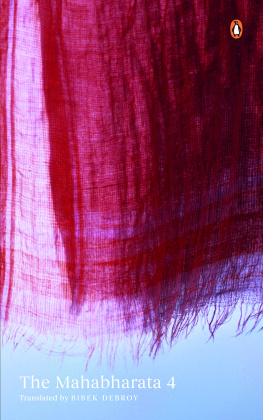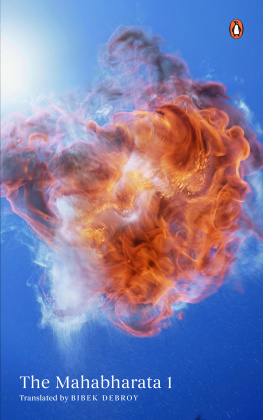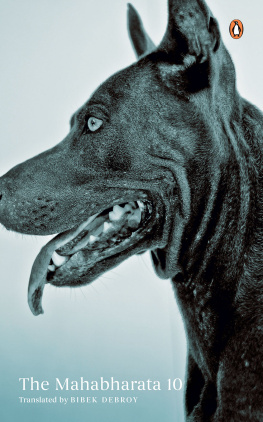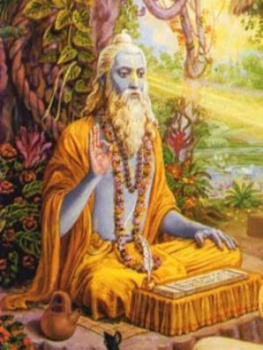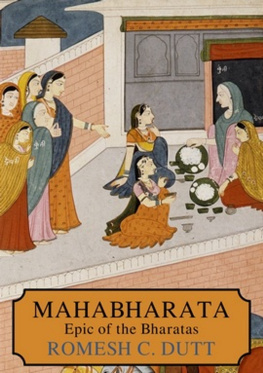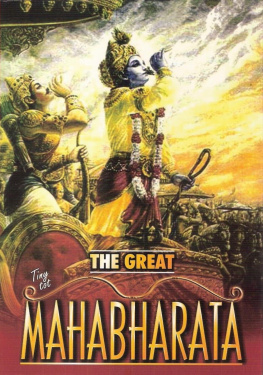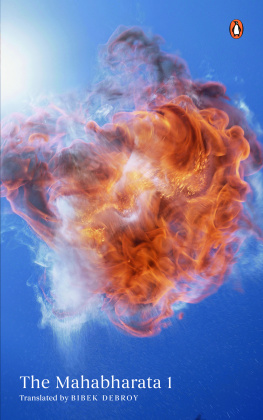Table of Contents

UNTOLD TALES FROM THEMAHABHARATA
UNTOLD TALES
FROM THE
MAHABHARATA
The Epic beyond the Obvious
Uday shankar

BLOOMSBURY INDIA
Bloomsbury Publishing India Pvt. Ltd
Second Floor, LSC Building No. 4, DDA Complex, Pocket C 6 & 7,
Vasant Kunj, New Delhi 110070
BLOOMSBURY, BLOOMSBURY INDIA and the Diana logo are trademarks of
Bloomsbury Publishing Plc
First published in India 2021
This edition published in 2021
Copyright Uday Shankar HC 2021
Uday Shankar HC has asserted his right under the Indian Copyright Act to be identified as the Author of this work
All rights reserved. No part of this publication may be reproduced or transmitted in any form or by any means, electronic or mechanical, including photocopying, recording or any information storage or retrieval system, without the prior permission in writing from the publishers
This book is solely the responsibility of the author and the publisher has had no role in the creation of the content and does not have responsibility for anything defamatory or libellous or objectionable
Bloomsbury Publishing Plc does not have any control over, or responsibility for, any third-party websites referred to or in this book. All internets addresses given in this book were correct at the time of going to press. The author and publisher regret any inconvenience caused if addresses have changed or sites have ceased to exist, but can accept no responsibility for any such changes
ISBN: PB: 978-93-90358-22-9; eBook: 978-93-90358-44-1
2 4 6 8 10 9 7 5 3 1
Typeset in Manipal Technologies Limited
Printed and bound in India by Thomson Press India Ltd.
To find out more about our authors and books visit www.bloomsbury.com and sign up for our newsletters
CONTENTS
Very few epics have captured the imagination of the reader as much as the Mahabharata, so much so that the reader is drawn to it repeatedly. Indeed, the Mahabharata, even though it dates back nearly five thousand years, has all the ingredients of a contemporary thriller and continues to hold readers in thrall with its various twists and turns.
Over the years, the Mahabharata has been told and retold many times over and as such, there are several different descriptions and versions of the epic in existence. This book, Untold Tales from the Mahabharata, is a collection of twenty short stories from the epic. Through this book, I have attempted to present some of the lesser-known tales, situations and characters in a narrative that is simple and easy to follow.
While writing this book, I have referred to the parvas and different versions of the Mahabharata that have been told in different parts of the country, from the north to the south. I also drew inspiration from the lectures and pravachans of pundits, speakers and gurus giving their perspective. I also met them individually and have been enlightened by their knowledge and interpretation of the epic. Having said that, I must also state that while staying within the realms of authenticity, I have also used the freedom afforded to me as a writer to creatively describe events in greater detail.
I wish to thank my publishers for the support that they have given me at every stage.
I dedicate this book to my parents for playing their part in its successful completion. I am grateful to them, especially my mother for regaling me with stories from the Puranas ever since I was a boy, and for impressing upon me that the art of storytelling is timeless.
A rjun and Duryodhan pay a visit to Krishna just before the war. Both men enter at the same time and maintain a stony silence, avoiding eye contact. As Krishna is resting, Arjun sits near his feet while the irrepressible Duryodhan takes a seat at the head of the bed, near the pillow. Krishna is in deep slumber, blissfully unaware of the presence of his visitors. After some time, he wakes up, and his gaze falls on Arjun.
What brings you here? asks Krishna.
Even before Arjun can answer, Duryodhan speaks up and says that he was there before Arjun. Krishna just smiles, greets the cousins and asks them the reason for the unannounced visit.
While Arjun remains silent, Duryodhan speaks up. O Dwarkadhish, in a few days, we will go to war against the Pandavas and I wanted a favour from you. I would like to requisition the services of your army the Narayani Sena in our fight against the enemy.
Krishna makes it clear that he would not be participating in the war as a combatant nor will he use his weapons against either party. However, he obliges Duryodhan and reassures him that the Yadava army will fight alongside the Kauravas. With one visitors request dealt with, Krishna turns to Arjun, who says:
Vasudev, I neither want your army nor do I want you to fight on our side. Your very presence is enough for us. So I request you to be my sarathy in the ensuing war. Krishna agrees immediately, and Duryodhan can hardly suppress his smile as he walks out of the chambers, a relieved man.

At Kurukshetra, Arjun stands regally atop his chariot driven by Krishna, facing the mighty Kauravas amongst whose ranks are invincible warriors like Bhishma, Dronacharya, Kripacharya, Karna and Ashwathama. His chariot, Nandighosha, is no ordinary vehicle. Made of solid gold, the chariot is drawn by four horses Saibya, Sugriva, Meghapushpa and Balahaka.
Krishna and Arjun are wandering through the Khandav Van, situated along the banks of the Yamuna river, looking in awe upon its sheer vastness, which was teeming with flora and fauna. This certainly is a place where the mind is at peace. The tranquillity is irresistible, so much so that given a choice, I would like to spend more time here doing tapasya, Arjun tells Krishna. Their conversation is interrupted by the arrival of a sickly looking man. Arjun, moved by the plight of the emaciated man, asks him the reason for his frail health. The man reveals himself as Agni, the god of fire.
O Dhananjay, my stomach is yearning for food, as it is in my nature to burn and consume. This Khandav Van is full of animals, birds and venomous reptiles. I have been trying to feast on them for quite some time. Every time I try to burn the forest, Indra intervenes and orders the clouds to open up. As a result, primordial floods douse the flames, leaving me hungrier than ever. You must help me Arjun, as I am sinking with little or no signs of recovery.
Why is Indra doing this? Arjun enquires.
There is good enough reason for his intervention, Agni responds. Takshak, the serpent king, is a good friend of Indras and enjoys his protection. He has made the forest his home and refuses to leave.
Arjun reassures him. O Agnidev. You ask for my help but fighting Indra is not a trifling matter. He has an array of celestial weapons and it would take an extraordinary effort on my part to defeat him. However, do not worry. I will help you. With Krishna by my side, I am confident of facing him despite his power and arsenal.
I agree with you that Indra is a fearsome adversary but my friend Varuna, the god of rain, will help you, as will I, Agni replies.
Agni then calls upon Varuna, who appears before Arjun and presents him with a divine bow along with a quiver full of arrows. The bow is strong enough to withstand the speed with which Arjun releases his arrows. Known as the Gandiva, the bow is destined to play an invaluable role in the impending Kurukshetra war. Finally, Agni presents Arjun with an incandescent chariot, Nandighosha, which is destined to play a stellar role in the Kurukshetra war.

